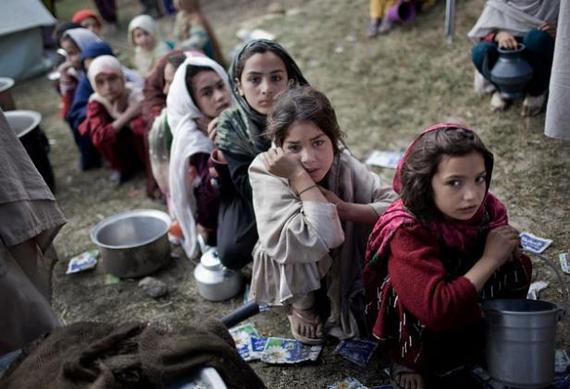June 20th is declared World Refugee Day. In this year, this day is being marked by another increase of 9 million refugees. The increase is mainly caused by the war in Syria. This year has seen crisis after crisis. These crises force desperate people to flee their homes in fear of bullets and bombs. The annual global trends report by the UN High Commissioner for Refugees (UNHCR) reveals that the number of refugees, asylum-seekers and internally displaced people has, for the first time in the post World War II era, exceeded 50 million people.
"We are seeing here the immense costs of not ending wars, of failing to resolve or prevent conflict. Peace is today dangerously in deficit. Humanitarians can help as a palliative, but political solutions are vitally needed. Without this, the alarming levels of conflict and the mass suffering that is reflected in these figures will continue" - High Commissioner for Refugees, Antonio Guterres.
The report states that "The Syrian Arab Republic had moved from being the world's second largest refugee hosting country to being its second largest refugee-producing country - within a span of just five years". Also 3.5 million refugees were residing in countries covered by UNHCR's Asia and Pacific region. More than 2.9 million were Afghans in Pakistan and Iran. Sub-Saharan Africa was host to more than 2.9 million, primarily from Somalia (778, 400), Sudan (605,400), the Democratic Republic of Congo(470,300), the Central African Republic (251,900), and Eritrea (198,700).
The current situation in Iraq will increase the number of refugee. In the past weeks, the situation from Iraq has become more clear and now we can see the fact that the conflict in Iraq is focused on the jihadist surge, led by the Islamic State in Iraq and the Levant. Even if the next negotiation that will involve Shiite leadership in Baghdad, the United States and a number of influential players in Iraq's Sunni political and tribal landscape are designed to wean Iraqi Sunni support away from the militant group, the situation will not improve. The sectarian violence will continue growing, the current political efforts will likely succeed in taking the momentum from the Islamic State in Iraq and the Levant-led offensive.
Ten years of war in this part of the world, the crisis from Ukraine, global economic crisis, have made Europe and the U.S. wish desperately to sit this crisis out. The american President Barack Obama said that any recourse to force the U.S. military will not help Iraq if its political leaders will not contribute to the unity of the country. This statement can be interpreted as the burden is on the regional players to prevent a jihadist mini-emirate from forming.
Turkey is struggling to insulate itself from the violence and to follow a strategic agenda in Iraqi Kurdistan. They are assisting Iraqi Kurdish to sell their crude. With the consent of Turkey's energy minister, two tankers carrying a few million barrels of Kurdish crude left the Turkish port of Ceyhan in search of a buyer. With Sheikh Ali Abdullah al-Dulaimi, called al-Maliki, relying on Kurdish peshmerga support to fend off jihads in the north, Ankara and Arbil have gained some leverage in their ongoing dispute with Baghdad over the distribution of energy revenue, but not necessarily on its own terms.
In the meantime, Iran has been expanding its military presence along its northern border with Iraq. They have to reinforce its Shiite allies in Iraq military but this strategy is very risky. The Islamic State in Iraq, the Levant and its militant affiliates would not have such success in seizing territory across Iraq's Sunni belt had. Iraq's Sunnis belts have no real fondness for the militant group and its jihadist predecessors. The group is seen as a tool to regain their seat at the negotiation table with Baghdad, to bolster their demands on issues like salaries for Sunni security and military forces, political representation and economic development in Sunni territory.
Another concern comes out from Saudi Arabia who stir the pot. It has just two interests: undermining the U.S. -- Iranian negotiating track and ensuring oil prices remain above $100 a barrel. As the United States becoming more self-sufficient in energy production, the Sunni kingdom have had to swallow a bitter pill and open up their own dialogue with Iran. Al-Maliki seems to be making some concrete steps in responding to at least some of the Sunni's demands (the six-month overdue salaries had been paid to the Awakening Council members in Anbar province), he also warned that Iranian-backed Shiite militias will try to annihilate the Sunnis. As a response, Sheikh Mahmoud al-Issawi pointed out that "both Sunnis and Shiites suffered from terrorism" and that now is the time for politicians of both sects to forget their differences to deal with the current threat.
But, as Shimon Peres said, "two things we can't do with the open eyes: love and peace!"
